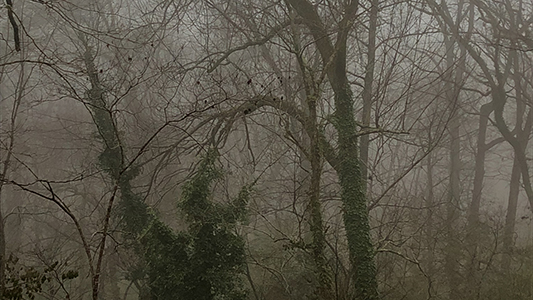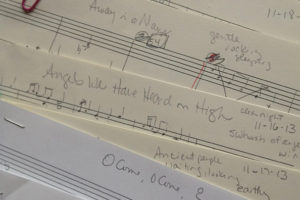I wrote “. . . As the mist resembles the rain” for Flute and Piano in 2002 for friend and flutist, Jane Weigel. The piece is a lyrical work for flute and piano inspired by Henry Wadsworth Longfellow’s poem “The Day Is Done” (1844). The flute’s long melodic lines represent one’s meandering inner thoughts at the end of day. Beginning simply, the melody rises to a more excited and dramatic temperament, and then relaxes again. Flowing thoughts bring feelings of sadness and longing and followed by a desire to soothe life’s difficulties, and then finally calmness giving way to benediction and rest.
Link to video. Link to score at Sheet Music Plus.
Longfellow’s Influence
Henry Wadsworth Longfellow (1807-1882) was an American poet and educator. Also, he was one of the most widely known and best-loved American poets of the 19th century. His works brought poetry into a higher standing in American society than it had ever enjoyed before. In addition, Longfellow’s poetry represented persons of all times, cultures, and states of life as turning to creative expression (music, song, poetry, storytelling, and pottery) for entertainment and reassurance. His works include “The Village Blacksmith”, “Paul Revere’s Ride”, The Song of Hiawatha, and Evangeline.
The lyricism and musicality of his work inspired other artists. Because of this quality, composers set many of his poems to music and artists illustrated many of his scenes. He also achieved international prominence and is one of the few American writers honored in the Poets’ Corner of Westminster Abbey.
Longfellow’s Life
Longfellow was born in Portland, Maine (then still part of Massachusetts). He remembered this thriving coastal city for its wharves, woodlands, ships, and sailors in “My Lost Youth” (1856). At age thirteen, Longfellow passed the entrance exams for Bowdoin College. His father wanted him to pursue a career in law or other profession, but Henry was more interested in literature. He bargained with his father to take a year of postgraduate study in literature and modern languages while he explored possibilities of supporting himself writing.
One story (possibly apocryphal) is that, upon graduation from Bowdoin College, the college offered him a position on the condition that he prepare for the post by going to Europe and becoming fluent in Romance languages. He did spend three years traveling around Europe, absorbing impressions of places and cultures, living with families in Madrid, Paris, and Rome, and developing fluency in various languages. Upon returning to Maine in 1829, he became a professor at Bowdoin College and immersed himself in teaching. Most of his publications for the next few years involved textbooks for students of Spanish, French, and Italian. From later comments, he apparently was not fulfilled by teaching.
In 1834, he was offered a professorship at Harvard, again (true story, this time!) with the condition that he study for a year abroad. Afterward, he returned to the United States in 1836 to join the Harvard faculty and taught there until 1854 when he retired to devote himself to writing. He died in 1882.
An interesting comment from Longfellow—
In 1832 he reviewed a new edition of Sir Philip Sidney’s A Defence of Poetry. Longfellow wrote: “the true glory of a nation consists not in the extent of its territory, the pomp of its forests, the majesty of its rivers, the height of its mountains, and the beauty of its sky; but in the extent of its mental power,—the majesty of its intellect,—the height and depth and purity of its moral nature.”
The poem that inspired “. . . As the mist resembles the rain.”
The Day Is Done
The day is done, and the darkness
Falls from the wings of Night,
As a feather is wafted downward
From an eagle in his flight.
I see the lights of the village
Gleam through the rain and the mist,
And a feeling of sadness comes o’er me
That my soul cannot resist:
A feeling of sadness and longing,
That is not akin to pain,
And resembles sorrow only
As the mist resembles the rain.
Come, read to me some poem,
Some simple and heartfelt lay,
That shall soothe this restless feeling,
And banish the thoughts of day.
Not from the grand old masters,
Not from the bards sublime,
Whose distant footsteps echo
Through the corridors of Time.
For, like strains of martial music,
Their mighty thoughts suggest
Life’s endless toil and endeavor;
And to-night I long for rest.
Read from some humbler poet,
Whose songs gushed from his heart,
As showers from the clouds of summer,
Or tears from the eyelids start;
Who, through long days of labor,
And nights devoid of ease,
Still heard in his soul the music
Of wonderful melodies.
Such songs have power to quiet
The restless pulse of care,
And come like the benediction
That follows after prayer.
Then read from the treasured volume
The poem of thy choice,
And lend to the rhyme of the poet
The beauty of thy voice.
And the night shall be filled with music
And the cares that infest the day,
Shall fold their tents, like the Arabs,
And as silently steal away.










Leave a Reply
Your email is safe with us.